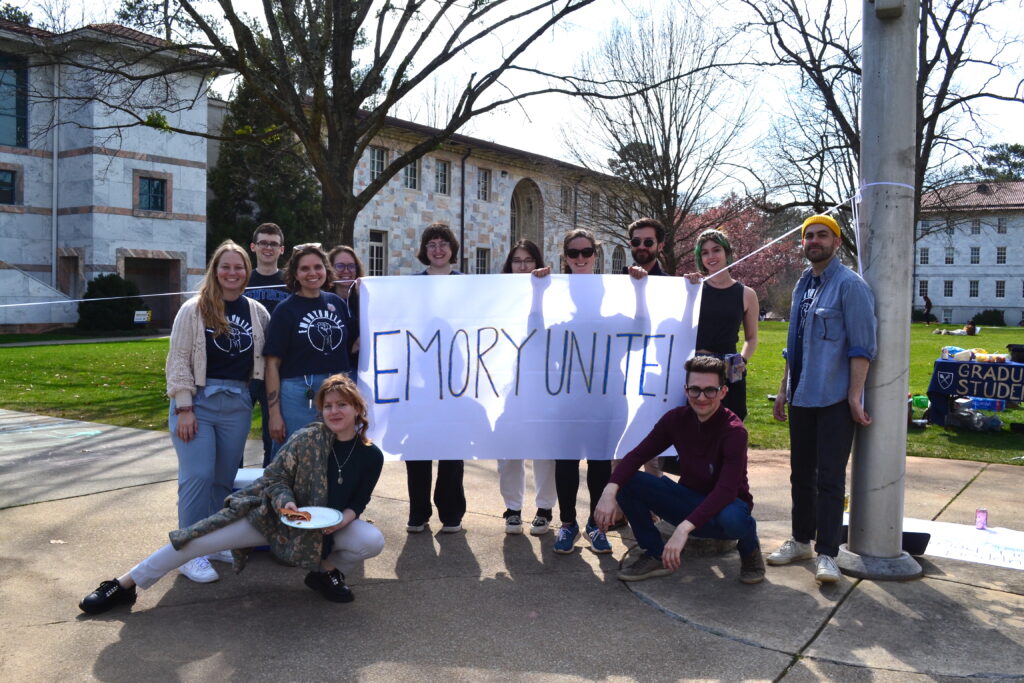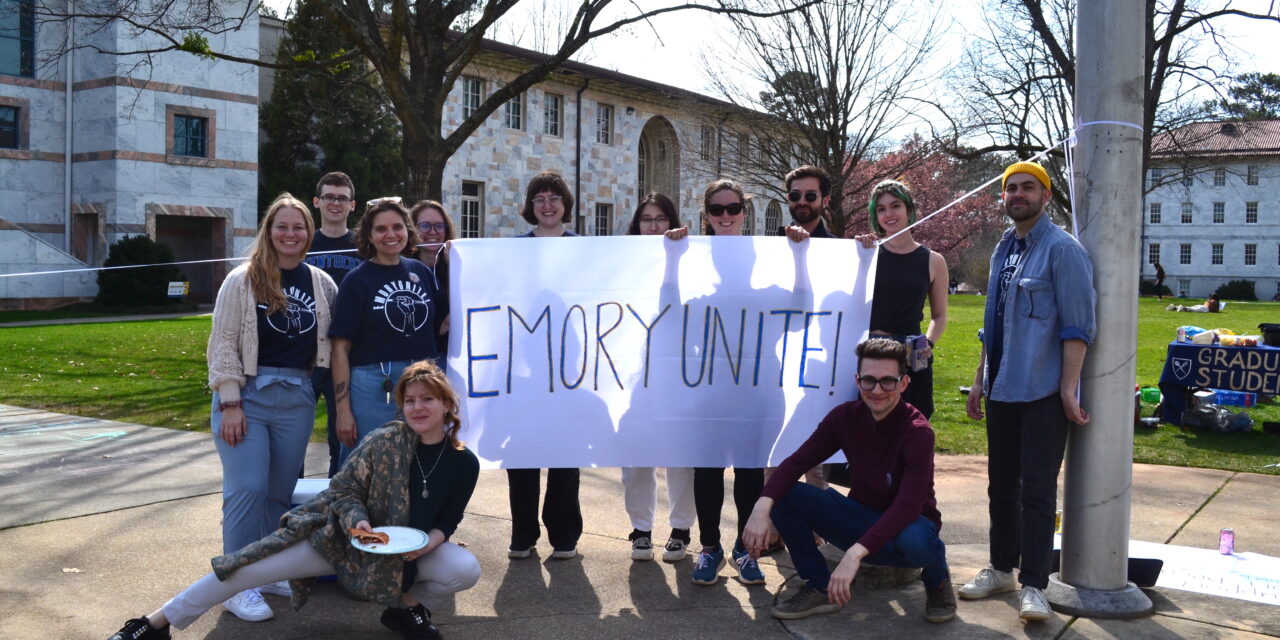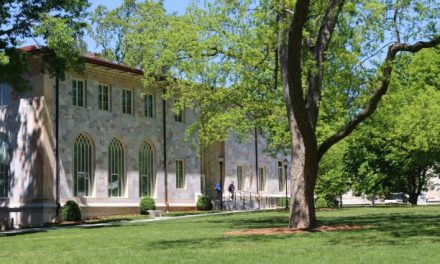Elijah Ullman’s (25G) mom has stage four cancer. She lives in Colorado, leaving over a thousand miles between her and her son, who is a Ph.D. candidate at Laney Graduate School.
Living on a graduate worker’s check, Ullman explained that he can barely scrape enough money together to visit his mom. He said that out of his monthly stipend from Emory University — which totals around $2,300 after taxes — about half goes to housing, followed by food and medical bills. He then has to pay for the phone in his pocket and the gas in his car.
This pushed Ullman to help reignite the movement to recognize EmoryUnite!, a graduate worker union based out of Laney, as a majority union under the National Labor Relations Board on Aug. 25, 2022. A majority union includes over half of the employees in a workplace.
Though EmoryUnite! has yet to form a majority union, the organization has helped create recent change, EmoryUnite! organizer Isaac Horwedel (17T, 23G) said. After continued pressure from students, the University announced on Feb. 13 that most Laney doctoral students’ stipends will increase by 6% starting in fall 2023. The stipends averaged to $34,595.63 during the 2022-23 academic year. With the increase, that average will rise to $36,637.53.
Additionally, business program stipends will increase by about 8%, from $37,000 to $40,000. Students in the biomedical engineering program, which is affiliated with the Georgia Institute of Technology, will continue to receive $34,500 without an increase.
“Increasing the stipend is a key priority for LGS and we continue to maximize our ability to support our students every way we can,” Assistant Vice President of University Communications and Marketing Laura Diamond wrote in an email to the Wheel. “We appreciate the dedication, commitment, and excellence demonstrated by our graduate students across programs at Emory.”
Ullman explained that although the increased stipend is beneficial, it still falls about $3,000 short of the living wage in Atlanta — which is about $39,375 for one adult without children — leaving Emory lagging behind some other institutions. For example, Washington University in St. Louis will offer graduate students a $37,000 stipend, falling above the city’s $33,571.20 living wage for one adult without children. Additionally, the University of Pennsylvania’s stipend also covers Philadelphia’s living wage.
“It’s going to be harder for them to bite the financial bullet of coming here,” Ullman said. “They’re still meeting a failing grade in that regard.”
However, some of Emory’s peer institutions also fail to pay Ph.D. students above living wage, including Vanderbilt University (Tenn.) and the University of Chicago.
EmoryUnite! goals
EmoryUnite! Organizer M Wu (27G) said that unionizing is the only route to truly impacting graduate students’ stipends.
“There’s only so much you can do working within the department that you’re a part of,” Wu said.
EmoryUnite! is currently gathering signatures from Laney students who support unionization through their card drive. Once 30% of Laney students sign the card, EmoryUnite! can file a representation petition with the National Labor Relations Board, which would decide if the group qualifies for an election day. If more than 50% of voters express support for unionization in the election, EmoryUnite! would become a recognized majority union, requiring university administration to bargain with them. !.
Hundreds of Laney students have signed the card drive out of the 1,883 students enrolled for the 2022 academic year, according to Horwedel. They are hoping to file for an election day this academic year.
If they do so, EmoryUnite! would be joining a recent wave of graduate student unionizing across the United Stat

EmoryUnite! members gather on the Quad to collect signatures and celebrate their progress on Feb. 20. (Soph Guerieri/Staff Photographer)
Living below living wage
This year, Laney graduate student workers’ average pay of $34,595.63 falls $4,778.77 under Atlanta’s living wage — a gap that EmoryUnite! organizer Jerik Leung (27G) said was shocking.
“A lot of it was due to feeling like I was pitched a certain kind of story or security about coming to Emory as a Ph.D. student, and a lot of challenges arose in that first year,” Leung said. “It’s not actually as easy to advocate for yourself, and the cost of living was higher than I expected, but also kept going up.”
Earning a living wage is one of the main goals of EmoryUnite!, Ullman added.
With food costs increasing by 9.9% in 2022, Ullman found in a survey of 50 to 80 Graduate Division of Biological and Biomedical Sciences students that 32.8% of respondents believe it is “often true” that they worry about running out of food before their next paycheck. Additionally, 45.6% of respondents indicated that it was “often true” that they are worried about secure housing options.
Ullman said that comparing the stipend to nearby housing costs paints a “grim” picture. In 2015, the average rent for a one bedroom apartment in Atlanta was $1,144. By 2023, that number had risen to $1,700 — a 48.6% increase. Meanwhile, the average monthly Laney graduate student worker stipend increased 43.79% during the same time period, going from $2,005.04 to $2,882.97.
Atlanta is experiencing the second highest inflation rate in the United States at 10.8%, only falling behind Metro Phoenix at 11%, according to the Bureau of Labor Statistics. Arts and Sciences Distinguished Professor of Economics Esfandiar Maasoumi explained that this exemplifies the “ethical” side of inflation, noting that the increase will immediately hit students.
“The amount of impact is huge because a very high percentage of their income, often all of it, is spent on necessities, and right now the price of necessities is going through the roof,” Maasoumi said. “The real value of incomes gets attacked, declines as you have inflation.”
Diamond wrote in an email to the Wheel that the University implemented the Graduate and Professional Student Housing Initiative to address this, allowing students to live within a 15 minute walk of campus at competitively pricesd housing. Construction is expected to conclude in fall 2024.
Horwedel and Ullman also raised concerns about health insurance. Currently, Laney student workers receive 100% of Emory’s student health insurance premium, amounting to $4,370 with family and domestic partner rates available. Diamond explained that “doctoral students have no out-of-pocket costs for health insurance premiums.”
However, Ullman alleged that for some students, this is still not enough, recalling that some students with health concerns were concerned about going to the doctor and facing a mountain of medical bills. His survey reported that 50% of respondents believe it is “often true” that they are worried about affording necessary healthcare and medications.
“If you’re worried about being able to afford health care, how are you gonna get good quality Ph.D. work done?” Ullman said. “Emory has enough that they can provide us the resources that we need, but they’ve decided that they don’t want to.”
EmoryUnite! Organizer Nadia Raytselis (27G) agreed, noting that she has to manage a chronic illness while using Emory’s insurance.
“Having to pay medical expenses is challenging on the stipend that we are given,” Raytselis said.
Diamond noted that although students have no out-of-pocket costs for health insurance premiums, the University understands that “every student has a unique set of healthcare needs, which causes their out-of-pocket healthcare expenses to vary.”
Diamond added that Emory knows graduate students are “concerned about cost of living” and shares their concern. She wrote that Laney Ph.D. students have their tuition covered each semester, and have the chance to earn financial support for professional development, such as attending conferences. She added that about one-third of Laney Ph.D. students receive funding beyond their stipend.
Additionally, all Laney doctoral students registered for summer 2022 received a one-time $500 payment to provide immediate assistance, while the University explored more permanent solutions in July 2022, according to Diamond. Then, in September 2022, most Laney students’ stipends increased 8%, while the business and biomedical engineering programs had a 6% increase, effective for this academic year.
“Emory has a strong history of listening to our students and working with them to address their concerns,” Diamond wrote. “This is part of our commitment to providing a student-centered educational experience.”
However, the 8% increase was originally set to be 3%, which was announced in February 2022 and reiterated in a June 17, 2022 email to students.
“They said that 3% was all that they could afford,” Ullman said. “You know, ‘Sorry, thoughts and prayers,’ essentially.”
Ullman and the Division Student Advisory Council, which he has since stepped down from, met with Provost and Executive Vice President for Academic Affairs Ravi Bellamkonda and Laney Dean Kimberly Arriola on July 7, 2022 to request a living wage. A month after the meeting, Ullman said Emory increased the stipend raise to 8%.
Ullman printed and framed the two emails announcing the 3% and 8% stipend increases as a reminder of the work he has done.
“They’re hanging on my wall as a trophy,” Ullman said. “A $3.5 million trophy.”
History of EmoryUnite!
EmoryUnite! was founded in 2016 after the majority Democratic National Labor Relations Board ruled that graduate students at private universities could unionize. The group began collecting signatures on their first card drive with the goal of being recognized as a majority union by the National Labor Relations Board.
Opposition from University administration was quick to follow, according to Jonathan Basile (22G), one of the original EmoryUnite! organizers. Basile said that after EmoryUnite! went public, Laney posted an FAQ page on their website with what he deemed “basic union busting talking points.”
The FAQs include information about what unions are and how they are formed, making note of the fact that removing an established union is “complex” and can take years — a statement that Basile called an “infantilizing” union busting tactic.
“We’re doing this because we want a union,” Basile said. “We’re not unaware of how serious the step we’re taking is, and it’s just kind of a way of scaring people who are on the fence.”
When asked if the University views the webpage as having union busting tactics, Diamond wrote that it offers “useful context” offering accurate information about unionization.
Following U.S. President Donald Trump’s election, the national tone surrounding unions became more hostile, Basile said. In this climate, Emory hired Proskauer Rose, a law firm that advises employers on cases involving union organization and has represented the University of Chicago, Duke University (N.C.), and Washington University in St. Louis. Horwedel described Proskauer Rose as “union busting.”
When asked about Emory’s history with Proskauer Rose, Diamond wrote that Emory is “committed to complying with the National Labor Relations Act” and engages with outside law firms for advice when appropriate.
EmoryUnite! also previously faced critique from members of the administration. In a 2017 statement to EmoryUnite!, former Laney Dean Lisa Tedesco, who returned to Emory this academic year as a special advisor to the provost, expressed that although the University supports students’ right to seek unionization, she did not believe that graduate students were employees. At the time, she wrote that teaching and research were part of their education and professional development, adding that a union would not be “productive” or “effective” for the learning environment.
Tedesco did not respond to an email from the Wheel asking for an updated statement. Additionally, Diamond did not address a question about Tedesco’s earlier statement or current opinion.
Former Provost and Executive Vice President for Academic Affairs Dwight McBride also told the Wheel in 2017 that although he wanted to listen to students’ concerns and determine if there is a way to address them, he did not support unionization. At the time, he said he would not want “an outside third party that doesn’t understand higher education” to make decisions about doctoral education.
“There are other ways of remedying concerns,” McBride said. “If we have … adequate lines of communication, I don’t think an outside third party that doesn’t understand higher education is what I would want involved in making decisions about doctoral education.”
McBride is now the president of the New School (N.Y.), where nearly 1,800 part-time faculty went on strike for a little over three weeks last year in demand of better pay and working conditions. New School Associate Director of Communications Will Wilbur wrote in two emails to the Wheel that neither McBride nor anyone else from the university were available to comment.
EmoryUnite! halted their card drive in 2017 to form a voluntary membership union, which collected membership dues and had less bargaining power, according to Basile. During this time, Basile said EmoryUnite! focused on raising awareness about specific issues on campus.
Meanwhile, EmoryUnite’s right to unionize was heavily debated. In 2019, the Republican majority National Labor Relations Board proposed a regulation that would no longer consider graduate students as employees, removing their rights to unionize. However, the National Labor Relations Board announced in March 2021 that it would be reverting back to the 2016 policy allowing graduate unions.
Throughout this time, Basile said EmoryUnite! was doing what they could to prepare and build a foundation for when they felt ready to launch a second attempt for National Labor Relations Board recognition.
“It was always our sense that it would … be a way of kind of preserving the foundation that we had developed,” Basile said.
When responding to an email from the Wheel with several questions about unionization, Diamond did not explicitly address an inquiry about Emory administration’s opinion on unionization on campus, despite being told that graduate students reported that Emory was unsupportive and used union busting tactics in the past.
Since reigniting their card drive, Horwedel said EmoryUnite! has not faced anti-union rhetoric from the University besides the FAQ page. He added that professors have been largely supportive, with 67 Laney faculty members signing an open letter in favor of EmoryUnite! since its publication this semester, as of Feb. 28.
Professor of Human Genetics David Weinshenker was among the faculty who signed the letter, saying that the students drive a lot of the research in his lab.
“Since they’re really doing that full time, having a livable wage is really important, so that they can really focus on that work and they don’t have to be really concerned with having to choose between rent and food and medical care,” Weinshenker said.
Horwedel agreed, saying that unions are vital for student success.
“It’s an important fight to have universities and colleges serve a sort of important social function and not just be these kind of big businesses,” Horwedel said. “If you believe in any kind of social role or function for colleges and universities, it’s an imperative to support unions.”
Bellamkonda did not respond to two requests for comment, instead referring the Wheel to Diamond. Arriola and Interim Senior Vice President and General Council Amy Adelman initially agreed to comment, but Diamond later responded to refer the Wheel to her own response. Senior Associate Director of Financial Aid Cindy Gershman did not respond to two requests for comment before Diamond referred the Wheel to her own response. Gershman was also unavailable for an interview.
Madi Olivier is from Highland Village, Texas, and is majoring in psychology and minoring in rhetoric, writing and information design. Outside of the Wheel, she is involved in psychology research and works for the Trevor Project. In her free time, you can find her trying not to fall while bouldering and watching Criminal Minds with her cat.







